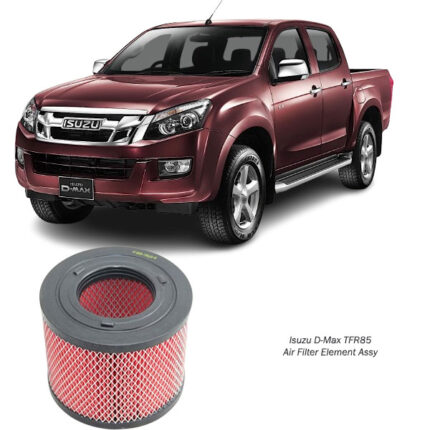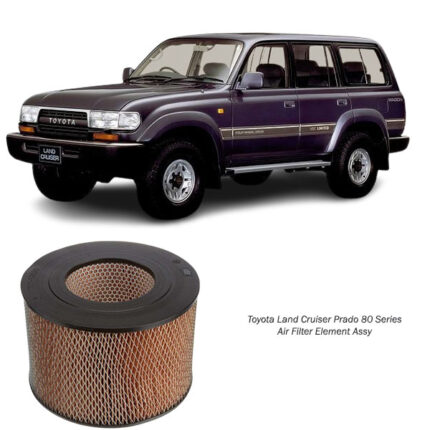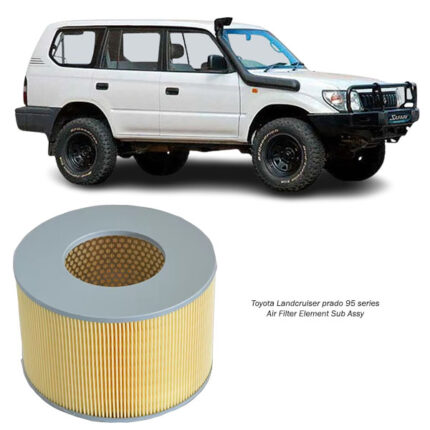Get Toyota LandCruiser Prado 95 Series Air Filter Element Assy 17801-67060 In Kenya
Every engine has a vital yet humble hero working silently to protect it from harm. It doesn’t move. It doesn’t make noise. But without it, your engine wouldn’t last long. We’re talking about the Air Filter Element Assembly—a small but mighty component that plays a critical role in maintaining engine performance, fuel efficiency, and longevity.
Let’s dive deep into what this part does, how it works, why it matters, and how to know when it’s time for a replacement.
What Is an Air Filter Element Assembly?
The Air Filter Element Assembly is a component located within your engine’s air intake system. Its primary job is simple, yet incredibly important: to filter the air before it enters the engine.
Here’s what the term means:
-
Air Filter: The actual filter media that traps dust, dirt, pollen, and other airborne contaminants.
-
Element: Refers to the core filtering component—usually a pleated, fiber-based structure.
-
Assembly: Encompasses the full housing and frame that holds the filter element in place inside the airbox.
In other words, it’s the “lung” of your engine, ensuring only clean, debris-free air reaches the combustion chamber.
Why Clean Air Matters for Engines
Engines need three main things to run: air, fuel, and spark. Of those, air is the most abundant—and it’s drawn into the engine from the surrounding environment. However, that air often carries dust, dirt, bugs, pollen, moisture, and even tiny metal particles, especially in dusty or urban environments.
Without filtration, these contaminants could:
-
Scratch and damage internal engine parts
-
Reduce combustion efficiency
-
Cause early engine wear
-
Contaminate engine oil
-
Lower fuel economy
-
Trigger check engine lights or sensor malfunctions
The Air Filter Element Assembly cleans the air before it enters the intake manifold, protecting your engine like a face mask filters harmful particles from the air we breathe.
Anatomy of an Air Filter Element Assembly
Let’s break it down:
-
Filter Media: Usually made of paper, cotton, or synthetic materials, pleated to increase surface area.
-
Rubber or Polyurethane Frame: Ensures a snug, airtight fit inside the airbox.
-
Support Mesh (optional): Provides structural integrity to prevent collapse under pressure.
-
Airbox Housing (external): Encases the filter and directs airflow.
The filter media is the star of the show—it traps up to 99% of airborne particles, depending on its quality. Over time, as the filter clogs, airflow becomes restricted, affecting engine performance.
How It Works: A Breath of Fresh Air
Here’s the journey air takes through the Air Filter Element Assembly:
-
Outside Air Intake: Air is drawn from the front grille or fender intake.
-
Through the Filter: As it passes through the filter media, dirt and debris are trapped.
-
Clean Air Exits: Only clean, filtered air continues through the intake tube into the engine.
-
Combustion Chamber: The clean air mixes with fuel and ignites for controlled combustion.
It’s a simple process—but vital. Even a small amount of dirt can damage pistons, valves, and injectors. The cleaner the air, the better the burn, and the more efficient your engine will be.
Different Types of Air Filter Elements
There’s a range of air filter types out there, each suited to different needs:
-
Paper Filters: Most common; disposable and cost-effective.
-
Cotton Gauze Filters: Often washable and reusable; popular for performance upgrades.
-
Foam Filters: Good for dusty or off-road conditions; used in motorsport or motorcycles.
-
Synthetic Filters: Durable, high-flow, long-lasting options.
Regardless of type, the key is filtration efficiency—measured by how well the filter traps fine particles while allowing sufficient airflow.
Symptoms of a Clogged or Dirty Air Filter
As the filter captures more dirt, it becomes restricted, reducing airflow. This can lead to:
-
Reduced engine power and sluggish acceleration
-
Increased fuel consumption due to richer fuel-air mixture
-
Rough idling or stalling at low RPMs
-
Black smoke from exhaust caused by incomplete combustion
-
Check engine light due to incorrect air/fuel ratio
-
Unusual engine sounds like coughing or popping noises
A clogged air filter is like trying to breathe through a pillow—you’ll feel the strain, and so will your engine.
When Should You Replace It?
There’s no one-size-fits-all answer, but general recommendations are:
-
Every 10,000–20,000 km under normal driving
-
More frequently if you drive in dusty, polluted, or off-road environments
-
During major tune-ups or scheduled maintenance
Pro tip: If you can’t see light through your filter when held up to the sun, it’s probably time for a replacement.
The Replacement Process: Quick and Easy
Changing an air filter is one of the easiest DIY maintenance tasks. Here’s how it’s typically done:
-
Locate the airbox (usually near the front or side of the engine bay).
-
Unclip or unscrew the airbox cover.
-
Remove the old filter and inspect it for debris or oil contamination.
-
Insert the new filter—make sure it fits snugly and sits flush.
-
Secure the airbox, ensuring no gaps or loose connections.
A clean air filter = instant performance and efficiency boost.
Benefits of a Clean Air Filter
Swapping out a dirty air filter may seem small—but the impact is big:
-
Improved engine performance and throttle response
-
Better fuel efficiency
-
Cleaner emissions
-
Prolonged engine life
-
Smoother acceleration
-
Reduced strain on sensors and fuel injectors
It’s like giving your engine a fresh breath of air—every time you replace it.
Tips to Maximize Air Filter Life
-
Keep the intake area clean—leaves and debris can clog the airbox.
-
Avoid dusty backroads when unnecessary.
-
Check the filter at oil change intervals for peace of mind.
-
Use quality filters from trusted brands for better sealing and filtration.
If you want to go the extra mile, consider installing a pre-filter wrap for off-road conditions—it catches large debris before it reaches the main filter.
Final Thoughts: Breathe Easy, Drive Strong
The Air Filter Element Assembly may be small and unassuming, but it’s absolutely essential to your engine’s health and efficiency. Think of it as your vehicle’s first line of defense against the harsh world outside—dirt, dust, pollution, and everything in between.
By keeping your air filter clean and replacing it on schedule, you’re doing more than just basic maintenance—you’re preserving engine life, saving fuel, and ensuring every drive is as smooth and powerful as it should be.
Follow us on Facebook for more parts




